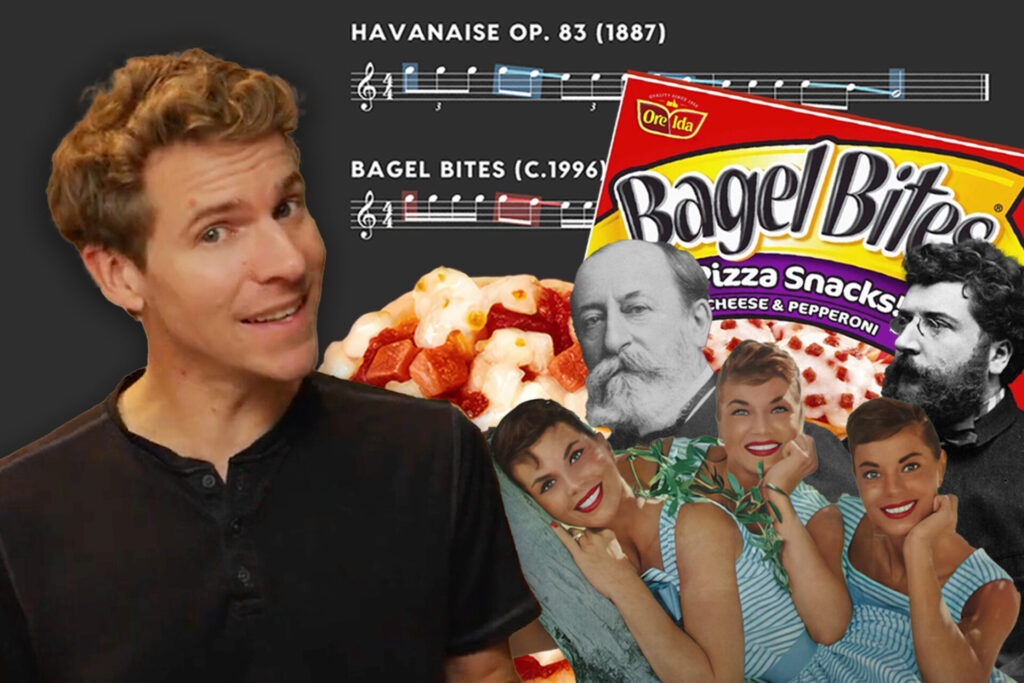Durchkomponiert. Don’t even try to pronounce that word — it’s been known to cause serious oral injuries to those who have tried. It’s German and you don’t even need to know how to say it because you can just say “through-composed.” It’s the same thing.
But what is it and why are we talking about it? Well, it’s a musical term related to the craft of songwriting and it can really open up a new world of understanding as well as creativity for you, so bear with me for a moment and let’s dig in.
Defining Durchkomponiert (Through-Composed)
Most songs nowadays have a ton of repetition. In fact, pop songs are getting more repetitive (and oftentimes more annoying). And don’t get me wrong, repetition is super important in songwriting. But too much of it and the song gets, well, boring.
Enter durchkomponiert. Through-composed music is continuous, it doesn’t have clear sections, and the music is not very repetitive. The rule of thumb is that if the song has different musical accompaniment for each new lyrical stanza, it’s through-composed.
For example, verse one has one piece of music. Verse two has a different piece of music. And verse three has a completely new section of music that’s different from the previous two verses. When it’s done well, it can have a powerful storytelling effect.
Where It Shows up in Music
So what are some examples of durchkomponiert? Once you see this list of very familiar songs, you’ll be like, “Oh, now I understand this strangely titled method for songwriting.”
“Bohemian Rhapsody” by Queen
If “Bohemian Rhapsody” sounds like a complicated song to you, that’s because it is. Not only is each section different from the last, but it also moves through the keys of B♭ major, E♭ major, A major, and F major in five minutes and 55 seconds. Oh, and it has 180 overdubs recorded using a 24-track analog tape.
“It was basically three songs that I wanted to put out and I just put the three together,” Freddie Mercury once said.
And you can definitely hear that in the song. Roy Thomas Baker, the producer of this song, admits that it was “totally insane.”
“[‘Bohemian Rhapsody’] was basically a joke, but a successful joke,” he said with a laugh. “We had to record it in three separate units. We did the whole beginning bit, then the whole middle bit and then the whole end. It was complete madness. The middle part started off being just a couple of seconds, but Freddie kept coming in with more ‘Galileos’ and we kept on adding to the opera section, and it just got bigger and bigger. We never stopped laughing.”
“You Never Give Me Your Money” by The Beatles
After long-time Beatles manager Brian Epstein passed away in 1967, the other members wanted to hire Allen Klein to help them handle their finances in place of Epstein. Paul McCartney did not like that idea, nor did he like Klein.
So he wrote this song.
“[‘You Never Give Me Your Money’] was me directly lambasting Allen Klein’s attitude to us,” McCartney said, according to the book Paul McCartney: Many Years From Now. “No money, just funny paper, all promises and it never works out. It’s basically a song about no faith in the person, that found its way into the medley on Abbey Road. John saw the humour in it.”
And like “Bohemian Rhapsody,” McCartney’s song came about by smashing together several unfinished songs. Apparently, McCartney also pulled inspiration from Keith West’s 1967 song: “Excerpt from a Teenage Opera.”
“The Soft Parade” by The Doors
According to Songfacts, Jim Morrison got the lyrics for “The Soft Parade” by combining different pieces of poetry he had written. I can’t confirm if that’s true, but it sure sounds like it when you hear the song. Backed by good ol’ guitar-drums-bass rock ‘n’ roll, this song takes you through a criticism of the American dream and modern life in general.
And like The Beatles’ “You Never Give Me Your Money,” this song also ends the album it appears on (also called The Soft Parade), thus taking the listener through one final musical and lyrical story before the needle finds the end of its own journey.
+ Learn production, composition, songwriting, theory, arranging, mixing, and more — whenever you want and wherever you are. Subscribe for unlimited access!

Why You Should Try Writing Through-Composed Songs
Now, what to do with all this?
Learning about durchkomponiert is cool, but applying it to your songwriting would be even cooler. So here are some reasons why you should start incorporating this method into your music.
First, trying to write a through-composed song will really stretch your songwriting muscles. If you’re at all like me and most other songwriters, you naturally slide into the A-B-A-B songwriting structure. And that’s fine, you can write great songs that way (most do!). But what if you stepped outside that box and wrote an A-B-C-D song?
It may be tough, but it will force you to put a lot of thought into it and it may even challenge your musicianship.
Second, I think we should all try this method of composing because it uses the element of story. Not only is the music by itself a sort of story, but the structure lends itself to lyrical storytelling. And stories are so compelling humans practically live on fiction in a nonfiction world.
And lastly, you might just end up with a great song like Queen. One of your best songs could be sitting in a pile of durchkomponiert, waiting for you to dig it out with your shovelriernt! So give it a try!
Get 1:1 coaching on your songwriting from a seasoned pro.
Soundfly’s community of mentors can help you set the right goals, pave the right path toward success, and stick to schedules and routines that you develop together, so you improve every step of the way. Tell us what you’re working on, and we’ll find the right mentor for you!





